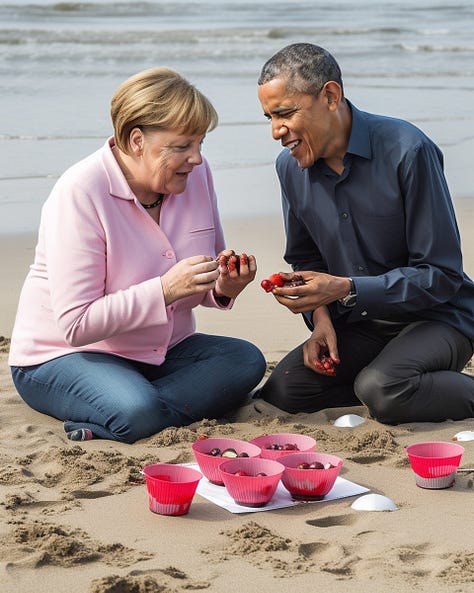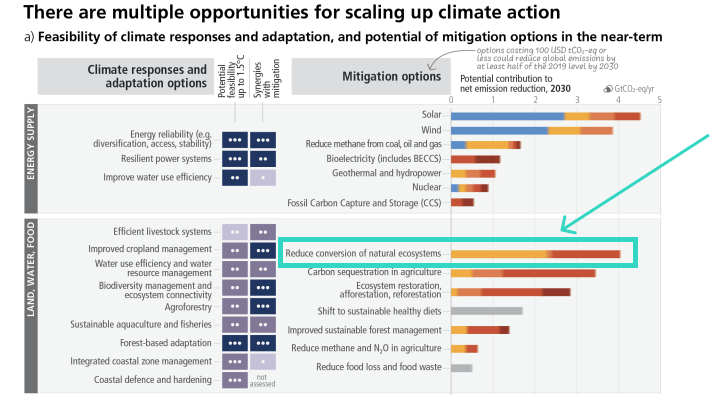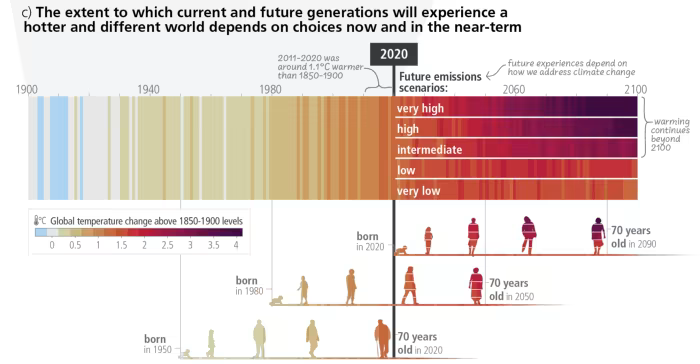Rethink° March
A lot has happened in March. We take a deep dive into the latest IPCC report (AR6), have a look at AI's rapid progress, and cover ground with a critique of neoclassical economics. Enjoy the read!
Dear all,
Springtime is coming in the Northern Hemisphere and the IPCC has published a 5-year summary. So, we’ll jump straight into that before we look at some good new-fashion neoclassical economics critique and the opportunities and threats AI poses to our society.
5-year-summary of the IPCC what’s there to say?
Let’s start with a quick one (as pointed out by Jay Lipman): What’s one of the most effective climate change mitigation strategies, according to the IPCC report?
After using solar and wind as energy sources, it is to simply stop destroying nature. No investment is required, no construction, nothing.
IPCC’s conservative nature masks the true scale of action needed to avert catastrophic climate change
📰 Teaser: The Intergovernmental Panel on Climate Change’s (IPCC) synthesis report (AR6) recently landed with an authoritative thump, giving voice to hundreds of scientists endeavoring to understand the unfolding calamity of global heating. What’s changed since the last one in 2014? Well, we’ve dumped an additional third of a trillion tonnes of CO₂ into the atmosphere, primarily from burning fossil fuels. While world leaders promised to cut global emissions, they have presided over a 5% rise. Continue Reading → (5 min)
🧐 Moritz’s two cents: I’ll make it short, the author certainly makes a point here. This includes high hopes for technical miracles, as green growther’s do (see our last episode for a take on that). A good example is BECCS (Bioenergy with Carbon Capture & Storage). It was an idea, mentioned in the IPCC and included in their calculations some years ago, but simply put: it does not work. (See here and here). So, I guess, stick to the recommendation from above – less is more. The carbon we save, we don’t have to store.
🤔 Max’s two cents: The author highlights an important limitation of IPCC reports and their influential recommendations to policymakers: any inherent biases in how their reports are generated. Not only is the validity and scientific method applied by the over 800 involved scientists (all pro bono, by the way! , but one needs to consider the limitations of the methods used to derive conclusions. Reports from the IPCC play an essential role in driving and guiding the climate transition. Many perspectives must be considered when trying to fix our climate woes, just as there is no silver bullet. It is impossible for one report to capture all the necessary nuances. You should read the reports, but please keep in mind that the language used and recommendations formulated should be much more urgent, social justice informed, and skeptical of future technologies.
Want to have a look insight the report? You can read the whole IPCC report here.
Climate change: the IPCC has served its purpose, so do we still need it?
📰 Teaser: The Intergovernmental Panel on Climate Change (IPCC) was created by the United Nations to analyze the science of natural and human-caused climate change, assess its risks and impacts, and provide options to address the challenges posed by climate change. Its reports take years to compile and publish, yet are the most comprehensive reports on the “current” (usually slightly dated by 1–2 years) of scientific knowledge and “mostly” science-based policy recommendations. Yet, the slow process, and internal power dynamics, reduced its effectiveness and should be reconsidered going forward in light of the urgency for effective and timely climate action.
Those not well-versed in climate change science tend to venerate the IPCC as a beacon of fact and authenticity. Without knowing the mandate, process, power relations, knowledge biases and inconsistencies, many hold up the IPCC as an untouchable icon.
🤔 Max’s two cents: We have already covered some methodological limitations of IPCC reports, but the process of how its findings and recommendations are refined and eventually published also matters a great deal. Hundreds of scientists collaborate under the auspices of the IPCC on a voluntary and pro bono basis to create its reports. These reports are subject to approval by government officials. However, it is important to note that governments can alter the reports. There have been attempts to remove or add specific information from or to the IPCC reports. Examples include the recent effort to eliminate information about losses and damages, deleting references to plant-based diets, or pushing for speculative negative carbon technologies (such as CCS) as effective and realistic climate mitigation efforts. Given these challenges, it is worth considering reforms, and at the very least reading the IPCC reports in light of their practical, methodological, and procedural limitations.
Climate graphic of the week: How climate change affects the generations
📰 Teaser: The lead visualization demonstrates how the average global temperature has increased by about 1.1 °C since 1900, using “warming stripes.” The graphic combines the lifespan of three generations. The team behind this visualization aimed to communicate the impact of climate change through the power of visuals.
🤔 Max’s two cents: Communicating the complexity of climate change and the various scenarios in which it could play out, depending on our actions today, has been a constant challenge for scientists and activists alike. This infographic from AR6 will likely become one of the most powerful graphic representations of climate change in the coming years. In a personal and relatable manner, it highlights the various warming scenarios and underlines the intergenerational justice aspect of climate change mitigation and adaptation It will hopefully motivate more immediate and effective climate action!
Why we need alternatives to capitalism and why we will not lose our jobs with degrowth
📰 Teaser: Prof. Jon Harvey, the cowboy economist, joins the host Rachel Donald in the Planet Critical Episode “Alternatives to Capitalism”. They elaborate how we went from Friedman and Hayek’s ideas (economic theory right here) of the free market to a deregulated monstrosity driving inequality and the climate crisis. They go into how the Cold War influenced neoclassical economics, and how to reimagine the relationship between governments, the private sector and citizens to create an alternative to capitalism. → Listen to the episode (50 min).
🧐 Moritz’s two cents: Warning, this is only if you are into economic theory, or rather you like to argue against neoclassical economics (which I certainly do). Then, this will cover some ground for you.
The second part of the podcast is worth listening to. Donald and Harvey speak about how to tame extractive capitalism. Harvey argues that neoclassical economics (I like that) is wrong and degrowth will not mean a loss of jobs. But what will happen to the people who now produce stuff that we wouldn’t need in a degrowth society?
Let’s chip in at minute 44:
There are things that are socially useful and profitable—great, let the private sector do those things (…)
There are things that are not socially useful but profitable (gambling for example), let’s see how we deal with those.
But there are many, many things that are socially useful and not profitable and those will never get done in our current system on a scale that is necessary (Climate Change, Public Education, Elderly Care). So, the government will do that and they can afford to do it.The United States for example can never become bankrupt on dollars, the UK could also do that—only in the EU it gets a little complicated.
NY Times: Yuval Harari on the risks of AI
📰 Teaser: Imagine that as you are boarding an airplane, half the engineers who built it tell you there is a 10 percent chance the plane will crash, killing you and everyone else on it. Would you still board?
In 2022, over 700 top academics and researchers behind the leading artificial intelligence companies were asked in a survey about future A.I. risk. Half of those surveyed stated that there was a 10 percent or greater chance of human extinction (or similarly permanent and severe disempowerment) from future A.I. systems. Technology companies building today’s large language models are caught in a race to put all of humanity on that plane. → Continue reading here (5 min).
🧐 Moritz’s two cents: AI is risky, it can lure us to the wrong track, accidentally provide us with misinformation and make it even harder for us to tell what is real (see some fake images at the end of the email).
Harari describes in his opinion piece that humans have already “lost” the first contact to AI, and that was even more primitive: our social media feeds. We believe human created lies that the algorithms serve us and it disrupts society. Now, we have the thing at scale. Because, we do not need the humans anymore to create the content, AI can now do it and the lies will even become better. 4 years ago, another historian, Niall Ferguson, has said something remarkable that will keep popping back into my mind, especially in this new AI debate.
Our time most closely resembles the period after the late 15th century, when the printing press (was invented). Nothing has happened like the impact of the personal computer and the internet since the advent of the printing press.
— Niall Ferguson (see the YT Video here)
When Europe introduced printing, not only good books and content spread rapidly, but also a book like Malleus maleficarum - Hammer of witches. Basically fake news that was the groundwork for burning over 40,000 innocent women as witches in 15th & 16th century Germany.
Let’s hope it does not go that way with social media, fake news and AI this time. I think (or hope) reality will play a bigger role again. The more fake we have on the screen, the more important the truths are that we see with our own eyes in the real world. And we might need to think of new instances of trust that we can transfer to the digital world. We already have the digital infrastructure in place (Blockchain – how could I not mention it in an issue?) but we need to make sure that the transfer of information from the real to the digital world is sound and safe.
I’m curious, what’s your take? How should we deal with AI to prevent it from rigging our society?
Not yet enough? Here are some evergreens and recent content we came across:
📈 In the last Episode, we read how Stegeman debunked “Green Growthist” Krugman. Parrique has another go on his take, enjoy.
🏦 For “ze Germans” reading the newsletter. Have you ever wondered what your bank does with all the money it holds? Now you know: A new fair finance guide is out.
💭 IPE EDHEC Climate & Finance Research Insights Supplement is out, with a great introduction to the shortcomings of current climate risk management methods.
📺 Extrapolations is a miniseries on Apple TV+ with each episode covering a realistic aspect of our likely, near term climate futures. Read on the series here!
🇬🇦 Gabon is leveraging innovative financial instruments to strengthen its conservation efforts.
🗞️ The ESG on a Sunday newsletter is for everyone who wants to keep up with developments in sustainable finance.
🌍 Planet Critical is an excellent podcast for everyone who is into changing the world.
📅 Rethinking is timeless. Read February’s issue.
Leaving you with a quote at the end of the third issue:
You come across something we might want to read/listen/watch? Send it to us or leave a comment.
We hope you enjoyed it. Please let us know & subscribe.
All the best, and keep rethinking,
How incredibly good has AI become in creating fake imagery?
See those images below. None of them are real:















